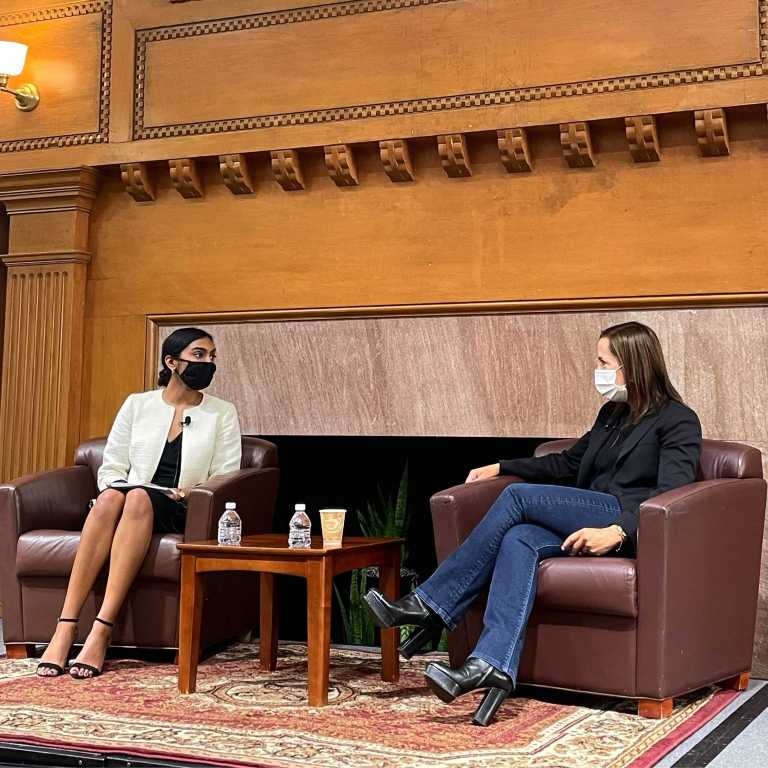Student organizations are making up for lost time together after rising COVID-19 cases pushed their programming online for the first three weeks of winter quarter.
University-issued restrictions limited in-person Voluntary Student Organizations (VSO) meetings in any capacity before Jan. 21. Following this outdoor gatherings were permitted, before all restrictions were lifted on Jan. 28 as on-campus COVID-19 case counts stabilized. Since then, student groups have tried to return to normal operations, meeting in-person and hosting events.
But the previous weeks of virtual meetings have caused a setback for some groups who rely on activities like rehearsals and community building.
For the Leland Stanford Junior University Marching Band, operating during the virtual period was a tall order, according to trombone section leader Dominic Demarco ’22. During the restricted period, the band missed two weeks of rehearsals and eight basketball games.
“I don’t think the University makes its policies with music groups at the top of its mind,” Demarco said.
While the pitfalls of the restricted period may have been less tangible for groups that could gather online, the impact did not go unnoticed. According to Cameron Lange ’24, vice president of the Stanford Democrats, virtual meetings made it difficult to “foster a sense of community.”
The transition to online meetings for the first few weeks was especially noticeable after a fall quarter “minimally impacted” by COVID-19, during which “we just wore masks during our weekly meetings,” Lange wrote.
The return to in-person meetings has “gone off without a hitch,” according to Lange, giving the Stanford Democrats the opportunity to host speakers in-person.
“We were thrilled that the campus-wide return to in-person meetings aligned with our event featuring Ajwang Rading, a Congressional candidate in this district,” Lange wrote.
While many groups chose to meet virtually in January, others opted to wait until in-person programming was possible to reconvene. Isabel Vila ’25, a member of Stanford Latino, said that waiting to hold the group’s first in-person meeting “was really nice because the point of the club is to form a community.”
For others though, the virtual format was also helpful at times. Manasa Kumarappan ’23, president of Stanford Women in Politics (SWIP), said that virtual meetings were a minimal challenge that ended up contributing to the success of the club’s speaker event with Valerie Jarrett, a former Obama-administration senior advisor, on Zoom.
Even so, Kumarappan recognized a sense of growing Zoom fatigue from many students, as virtual club meetings were stacked on top of virtual classes.
“I think there was less of a feeling of wanting to hop on to Zoom at the end of a long day of school,” she said.
The greatest challenge posed by the COVID-19 restrictions for SWIP has been space registration, which usually involves selecting a space for the entirety of the academic year. This year, however, the club had to switch to a quarter-by-quarter space registration process, according to Kumarappan.
“All these student groups used to be in all these different community spaces on campus, and now we all need to somehow find a time slot that works for us at the Haas Center,” Kumarappan said, adding that space registration became complicated as buildings like the Women’s Community Center were closed due to COVID-19 measures.
“It would be really helpful to have more guidance in terms of all the different places that are open for space registration,” Kumarappan explained.
Regardless of how groups were impacted by the virtual start to the quarter, most are working hard to take advantage of the return to in-person programming. Demarco said he is hopeful that the band will have more opportunities for in-person activities like traveling with the basketball team.
“We’re very optimistic about being able to provide the incredible experience of getting to play in different venues, and travel across the country and be completely subsidized for it as well,” he said.
Maintaining a positive group spirit while navigating the challenges, Demarco added, is the most important part of sustaining community during the pandemic. As Stanford Athletics welcomes fans back to attend home games, he hopes that the band can continue to spread positivity. ”It’s always rewarding to make music to rock out to and to get to cheer on and perform for the basketball teams,” Demarco said.
